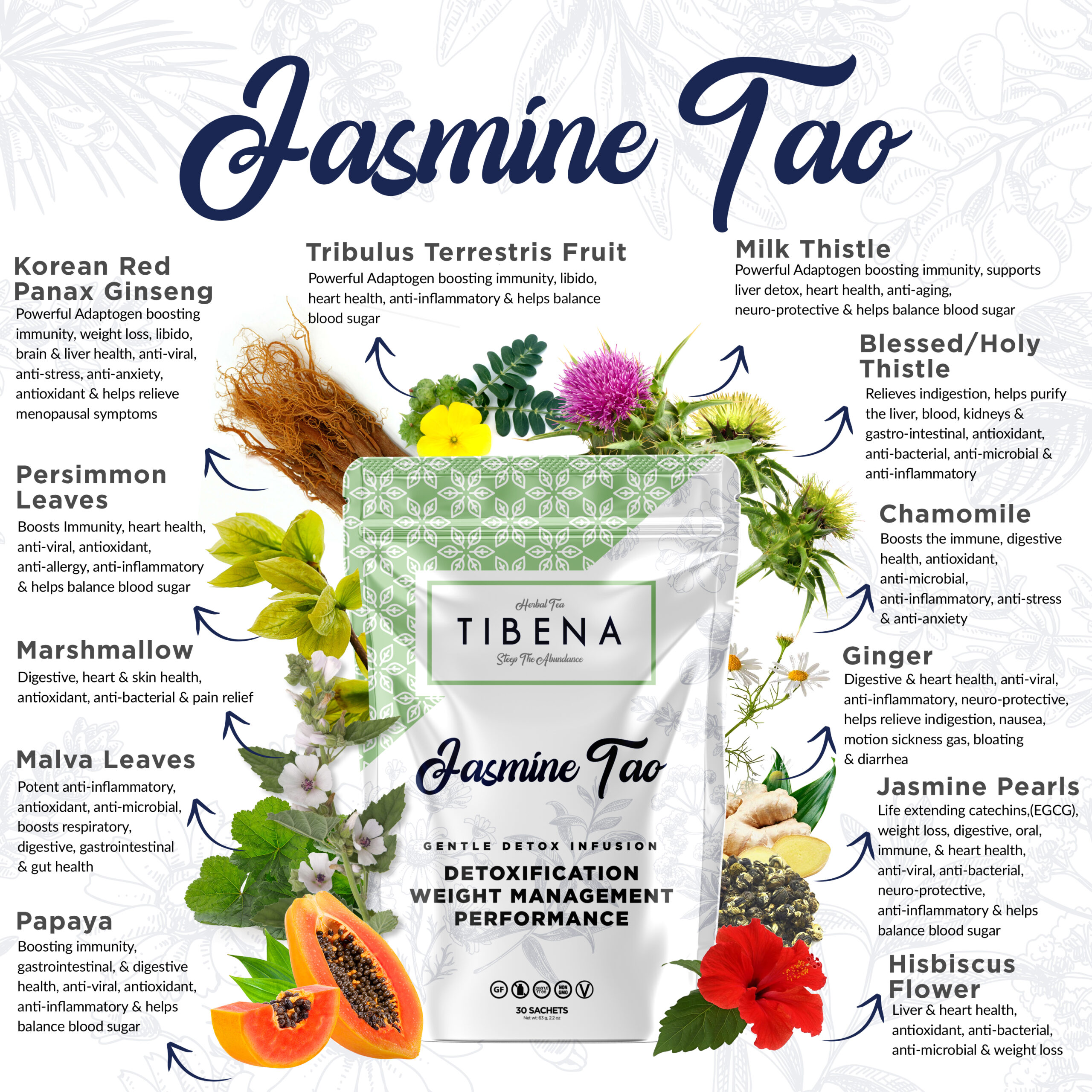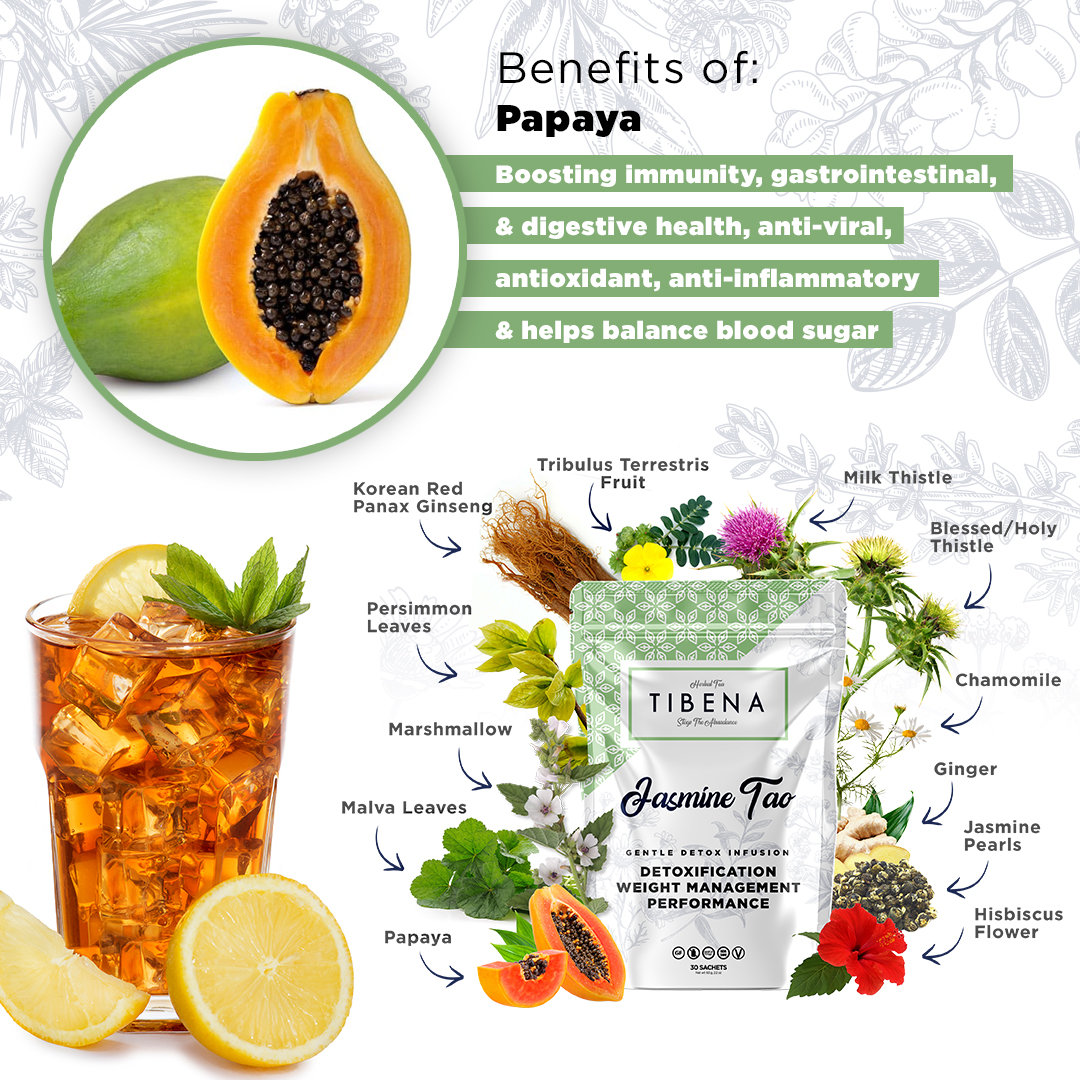
Studies have shown Potential Benefits:
Anti-viral, antioxidant, anti-inflammatory, promoting healthy gastrointestinal & digestion, boosting the immune & helping balance blood sugar
Papaya
The enzyme papain in papaya leaves assists in the digestion of proteins and is useful for treating gastrointestinal disorders. Tea with papaya leaves have been shown to help alleviate heartburn discomfort. Papaya leaf tea protected against gastric ulcer in the study on laboratory animals published September 2008 issue of the “West Indian Medical Journal” the papaya leaf extract reduced ulcer severity and showed strong antioxidant effects. Researchers concluded that papaya leaf tea shows potential for the treatment of gastric ulcer and oxidative stress on the stomach. Papaya contains the digestive enzymes papain and chymopapain which assists digestion which improves overall health. Papaya leaf tea also contains the enzyme Fibrin which acts naturally to provide blood platelet support by helping to improve white blood cell function. A study published in the February 2010 issue of the “Journal of Ethnopharmacology ” indicate the immune-modulating properties of papaya leaf tea may prove to useful in treatment and prevention illness.”
In the tissue culture study, papaya leaf tea reduced inflammation and activated immune system toxic effects toward cancer cells, inhibited tumor cell growth and stimulated genes that modulate the immune system’s anti-tumor effects.
Scientists wrote that the anticancer effects of papaya leaf tea may be due to the stimulation of immune cells that kill cancer cells. University of Florida researcher Dr. Nam Dang, one of the team members responsible for the study, elaborated on the university’s website that papaya leaf tea demonstrated no toxicity on human cells, potentially making it a safe, natural treatment for many forms of cancer.


https://www.ncbi.nlm.nih.gov/pubmed/21406063 – Papaya proteases as therapeutics, cardiovascular
https://www.sciencedaily.com/releases/2010/03/100309182449.htm# – anti-cancer – University of Florida researcher Nam Dang, M.D., Ph.D., and colleagues in Japan have documented papaya’s dramatic anticancer effect against a broad range of lab-grown tumors, including cancers of the cervix, breast, liver, lung and pancreas. The researchers used an extract made from dried papaya leaves, and the anticancer effects were stronger when cells received larger doses of the tea. Papaya was shown to promote the production of Th1-type cytokines, important in the regulation of the immune system. For that reason, the study findings raise the possibility of future use of papaya extract components in immune-related conditions such as inflammation, autoimmune disease and some cancers.
https://www.ncbi.nlm.nih.gov/pmc/articles/PMC4540030/ – A randomized placebo controlled trial of digestive enzymes in children with autism spectrum disorders. The ASD group receiving digestive enzyme therapy for 3 months had significant improvement in emotional response, general impression autistic score, general behavior and gastrointestinal symptoms. Our study demonstrated the usefulness of digestive enzyme in our population of ASD patients.
https://www.ncbi.nlm.nih.gov/pubmed/9767059 – Anti-Viral – https://www.ncbi.nlm.nih.gov/pmc/articles/PMC88900/ – Virus-encoded proteases have emerged as new targets for antiviral intervention
https://www.ncbi.nlm.nih.gov/pubmed/19961915 – Since Carica papaya leaf extract can mediate a Th1 type shift in human immune system, our results suggest that the CP leaf extract may potentially provide the means for the treatment and prevention of selected human diseases such as cancer, various allergic disorders, and may also serve as immunoadjuvant for vaccine therapy.
https://www.ncbi.nlm.nih.gov/pmc/articles/PMC4327787/ – Dengue Fever Virus– A small molecule inhibitor of dengue virus type 2 protease inhibits the replication of all four dengue virus serotypes in cell culture.
https://www.ncbi.nlm.nih.gov/pmc/articles/PMC3757281/ – Increases Plalet and Red Blood Count and Dengue Fever Implications
https://www.ncbi.nlm.nih.gov/pmc/articles/PMC4030975/#B7-biomolecules-03-00923 – Research Applications of Proteolytic Enzymes in Molecular Biology
https://www.sciencedaily.com/releases/2010/03/100309182449.htm# – Papaya extract thwarts growth of cancer cells in lab tests.
https://www.ncbi.nlm.nih.gov/pubmed/23190471– and https://www.ncbi.nlm.nih.gov/pubmed/27128930
Potent antioxidant and blood-sugar-lowering effects. This is attributed to papaya leaf’s ability to protect insulin-producing cells in the pancreas from damage and premature death
https://www.ncbi.nlm.nih.gov/pubmed/23524622 – Supports Digestive Health
https://www.tandfonline.com/doi/full/10.3109/1547691X.2016.1149528 – Anti-inflammatory & boost immune
https://www.ncbi.nlm.nih.gov/pubmed/31315213 – Potent anti-inflammatory benefits
